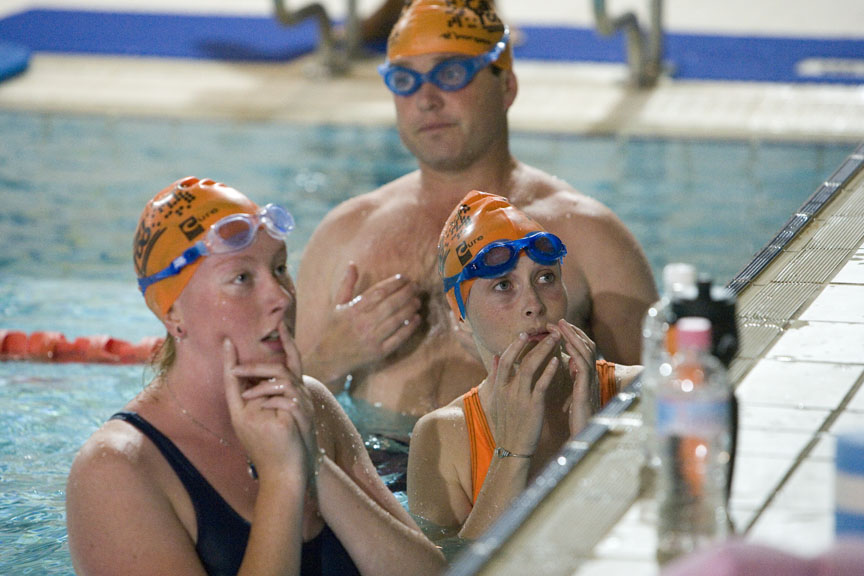
Can Too funded cancer researcher, Dr Emmy Fleuren will be swapping her lab coat for a beach towel as she joins Can Too's Autumn swim Program as a participant and ambassador.
It will be the first time the Senior Scientist takes on the goal of completing an ocean swim, the Sydney Harbour Splash on 25 April by training with Can Too. She decided to challenge herself to support the Foundation who has funded her research for two years at the Children’s Cancer Institute.
“As an early career cancer researcher working on a rare cancer, I know first-hand how difficult it is to obtain research funding. Can Too has given me the wonderful opportunity to set up my own research line, and I want to do something in return to help support other early career researchers,” said Emmy.

“I’m dedicated to help improve the cure rate of children with sarcoma using therapies that specifically target tumour cells and are therefore not only more effective, but also much less likely to cause damaging side effects,” says Emmy.
“My goal is to use the targeted treatment strategies that we develop in the lab to both help the children with sarcoma taking part in the ZERO Program, plus initiate new clinical trials for children with sarcoma using better and less toxic drugs, and we are making encouraging progress in our research.”
Why is funding for early career cancer research so important?
I cannot stress enough how important it is to help support early career cancer researchers. Cancer research is a very competitive field, and for every idea that you have and want to investigate, you need to get funding first before you can actually do it.
The success rate for (government) grant applications is however only 10 per cent or less. Many of the unfunded projects are however also ranked highly and have the potential to impact the field of cancer research, but missed out because of limited funding. It is particularly difficult to be successful in such funding rounds when you are an early career researcher.
It is these young researchers that often have exciting and innovative ideas, but if you do not get the chance to establish your own team and drive your studies, a lot of talent is lost at this stage. It is pertinent that we invest in these young researchers now, as they will be the future of cancer research.
Your message to Can Too participants:
Government funds are insufficient to allow us to keep seeking and finding solutions to fight cancer, so your donations are so important, thank you again.
You’re a part of a community doing something really positive about cancer.
Why were you inspired to become a cancer researcher?
I always had an interest in cancer, but it wasn’t until I started my PhD that I became interested in sarcoma,” says Emmy. “I got to know a girl with Ewing sarcoma who’d been through many treatments, including an amputation. When she died, I decided I wanted to work on these cancers. They are so aggressive, people affected are often very young, and treatment is so harsh.
Implications for the future of cancer treatment in children:
The ultimate goal and implication of my research is providing better, kinder treatments for young people suffering from sarcoma.
Research program:
My research is embedded in the Zero Childhood Cancer Program (ZERO), which recommends individual, tailored treatments for children with high-risk cancer based on the results of tumour analysis. The aim of my research is to maximize the chances of curing sarcoma, using novel approaches and establishing strategic collaborations, including the investigation of activated drug targets, immunotherapy and combination therapies.
My main focus is looking for those drug targets (proteins) that are not merely present or overexpressed in sarcoma, but I am trying to pinpoint those that are actually “switched on” and activated, driving the disease. This is crucial for developing better treatments for sarcoma.
Latest Awards/Highlights
- 2021, Guest Editor leading the Special Issue on “Pathogenic Mechanisms and Novel Therapeutic Approaches for Sarcomas” for a scientific journal
- 2019, Speaker at two major national and international sarcoma conferences: Connective Tissue Oncology Society Meeting (CTOS; Japan) and Australia and New Zealand Sarcoma Association (ANZSA; Canberra)
- 2019, Early Career Researcher Travel Grant – Kids Cancer Alliance
- 2019, Early Career Researcher Rapid-fire 2nd place - Kids Cancer Alliance
- 2018, Travel grant – Biochemical Society
- 2017, Young Researcher Award - EURO EWING Consortium (EEC) and Peter Pan Charity
What led you on your journey to join the Can Too Autumn Swim Program?
As an early career cancer researcher working on a rare cancer, I know first-hand how difficult it is to obtain research funding. Can Too has given me the wonderful opportunity to set up my own research line, and I want to do something in return to help support other early career researchers.
Have you ever completed an ocean swim before? No
What’s your exercise/fitness background or favourite sport/activity to do? I love boxing! I started when I was working in the UK, and it is a great way to both stay fit, and handle stressful moments. On the weekends, I love to go for a run near the ocean; it is so incredibly beautiful there and really gets you in a happy weekend mode.
I’m listening to: different types of music, but currently the Tomorrowland playlist.
What’s something we don’t know about you? When I was (very!) young, I wanted to be a cashier, because I liked maths.









